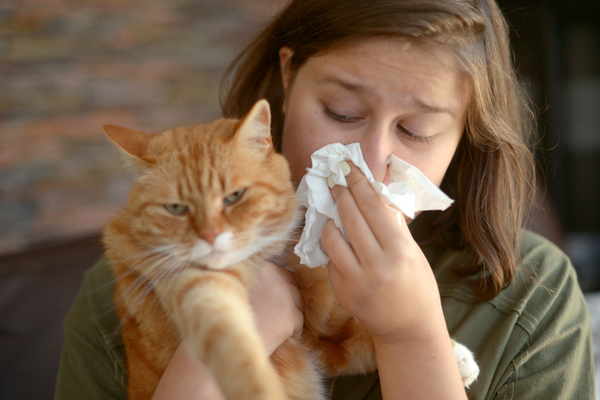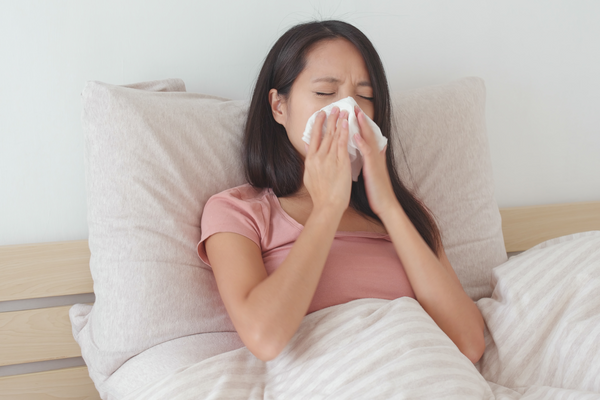Is There a Difference Between Food Allergies and Environmental Allergies in Dogs?

If your dog suffers from chronic itching, skin and ear infections, and hair loss, they may have allergies. But does your four-legged friend have a food allergy, an environmental allergy, or both? Just as they are for humans, allergies in dogs are an exaggerated immune response to a typically harmless substance. However, the uncomfortable symptoms of allergies can have a devastating impact on your dog’s well-being and quality of life. Not to mention, coping with your beloved pet’s allergies can also be stressful, expensive, and heartbreaking all at the same time.
Food allergies and environmental allergies pose challenges for dogs and their owners. To make things more complicated, the symptoms of all different allergic conditions often overlap. Diagnosing food and environmental allergies in dogs tends to involve a lot of trial and error and requires other treatments, so having as much information as possible will be helpful to get to the bottom of your pet’s condition. While allergy symptoms can usually be controlled, there is no cure.
What Are Common Symptoms of Allergies in Dogs?
Like people, the symptoms and severity of allergies in dogs can vary and range from mild skin irritation to anaphylactic shock. If your dog has a severe allergic reaction, your best course is to get them to an emergency veterinary hospital as quickly as possible.
Generally, the following symptoms could be a sign of an allergic reaction in dogs:
- Itchiness
- Sneezing
- Chronic ear infections
- Excessive licking, scratching and chewing at particular areas of the body
- Open sores, scabbing, and hair loss
- Swelling of the face, lips, ears, eyelids, or ear flaps
- Runny nose
- Red, inflamed skin
- Vomiting
- Diarrhea
- Hives
- Itchy, red, watery eyes
Remember that these symptoms could also be a sign of another condition. If your dog shows signs of any adverse symptoms, consult with your veterinarian right away to get an accurate diagnosis and help your dog start feeling better.
What Are Food Allergies in Dogs?
Food allergies in dogs are less common than environmental allergies, and dogs suffering from allergic reactions to food are more likely to react to allergens in their environment.
While any individual dog can be allergic to almost any food ingredient or ingredients, many experts point to animal proteins as the most common culprits. A 2016 study on typical food allergen sources in dogs and cats identified dogs’ most common triggers for food allergies include beef, dairy products, chicken, and wheat. Symptoms of food allergies in dogs can range from skin conditions (itchiness, facial swelling, hives, etc.) to gastrointestinal signs (vomiting and diarrhea) or both. A severe reaction resulting in anaphylaxis can occur in rare cases, similar to severe peanut allergies in humans. Finding a diet free from offending ingredients for dogs diagnosed with food allergies is life-changing for the dog.
What Are Environmental Allergies in Dogs?
Environmental allergies are incredibly common in dogs of all breeds and backgrounds. Unlike environmental allergies in humans, which are typically triggered via inhalation, dogs tend to absorb allergens through their skin and paws. Most allergies appear after the dog is six months of age, with most affected dogs over the age of one or two years old.
Notably, new research has linked similar allergic traits in dogs and their owners to their living environment, lifestyle, and microbial exposures.
What Are Common Symptoms of Environmental Allergies in Dogs?
Many substances can act as allergens. Most are proteins of insect, plant, or animal origin. The most common environmental allergens for dogs include:
- Molds
- Dust and dust mites
- Tree and grass pollen
- Flea saliva (which causes a disease called flea allergy dermatitis)
- Synthetic fragrances
The most commonly affected areas are the ears and paws, but can also include the wrists, muzzle, underarms, groin, around the eyes, and in between the toes.
Related: Dust Mite Allergies in Dogs: How to Reduce Allergens & Give Your Dog Relief
How Are Environmental Allergies in Dogs Diagnosed and Treated?
Your veterinarian will best guide you in diagnosing and treating your dog’s allergies. Depending on the severity of symptoms, a veterinarian can provide more aggressive treatments such as antihistamines, steroids, or allergy shots, also known as immunotherapy.
However, a comprehensive approach to treating allergies is by far the most effective strategy to avoid symptoms and find relief.
Pet owners can take powerful steps at home to neutralize the threat of allergens and help their dogs feel better. With The Ecology Works Anti-Allergen products, you can address the source of your dog’s allergies, not just symptoms.
How Can You Keep Your Dog's Environmental Allergies at Bay?
Once you’ve determined what exactly your dog is allergic to, it’s essential to avoid those substances when possible. Here are a few things you can do to help keep your dog’s allergy symptoms and discomfort at bay:
-
Remove Allergens from Your Dog’s Fur
Regular bathing can help prevent allergy triggers from allergens that can be caught in the fur. The Ecology Works Anti-Allergen Pet Shampoo helps dogs overcome skin problems caused by dust mite allergens and dander while also cleaning and conditioning for a soft and healthy coat. Our pet shampoo also helps eliminate fleas and ticks.
-
Switch Up Your Walking Routine
If your dog has a tree or grass pollen allergy, avoid walking them in the early morning and late afternoon, when pollen levels are typically highest. Also, try to steer clear of parks and open fields where offending plants are usually abundant. If you do walk on a day when pollen levels are high, bathe your dog with the Anti-Allergen Pet Shampoo when you return home.
-
Wash Your Dog’s Laundry with Anti-Allergen Laundry Detergent
Once a week, or more often, if your dog has severe environmental allergies, wash your dog’s bed, blankets, and stuffed toys with The Ecology Works Anti-Allergen Laundry Detergent to remove allergens from dust mites, dander, and molds. Our hypoallergenic laundry detergent is recommended by allergists and dermatologists and is highly effective against stains, odors, and grime.
In between washes, thoroughly vacuum your dog’s bed and spray it with The Ecology Works Anti-Allergen Solution to neutralize common household allergens.
-
Frequently Vacuum Carpet, Rugs, Upholstery
Use a HEPA vacuum to vacuum soft surfaces like carpet, rugs, and upholstery to capture dust, pet dander, and other airborne allergens at least once a week. After sweeping, spray surfaces with our Anti-Allergen Solution to eliminate the allergic effects of pet dander and dust mites. Its gentle formula will not damage the surfaces or articles treated.
-
Avoid Chemicals Triggers
Besides environmental allergens like dust mites and molds, dogs can also be allergic to chemicals found in household cleaning products. And even if they aren’t allergic, chemicals like bleach, ammonia, and fragranced cleaners can irritate dogs. To avoid these chemicals, the best way to start is by reducing the exposure in your home.
Our all-in-one cleaner, stain remover, and disinfectant, Vital Oxide, is free bleach, ammonia and fragrances. Vital Oxide is suitable for daily use and it’s perfect for cleaning every area of the home and pet messes. Bonus: Vital Oxide cleans away allergens and destroys odors!
Related: Have Pets? Consider Ditching These Chemicals
Have questions about reducing common indoor allergens? We have answers! The Ecology Works has been helping people and pets with allergies since 1993. We can help you select the products you need to live a better, allergen-free life. Please feel free to Contact Us or message us on Facebook. No question is too small! We’re here to help.






